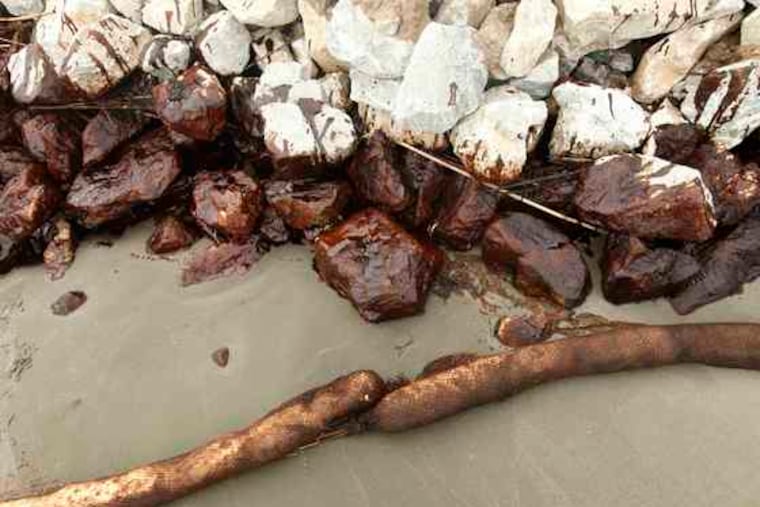Another BP bid to plug oil near
Government report alleges cozy oil ties with regulators.

WASHINGTON - BP on Tuesday prepared yet another attempt to plug a well gushing oil into the Gulf of Mexico, while a government report alleged that some drilling regulators have been so close to the industry, they have been accepting gifts from oil and gas companies and even negotiating to work for them.
On Capitol Hill, lawmakers debated proposals to replace a law that caps oil-spill liability at $75 million for economic damages beyond direct cleanup costs.
One proposal would raise the liability limit to $10 billion, while another would remove the cap. Yet another, advanced by Sens. Lisa Murkowski (R., Alaska) and David Vitter (R., La.) Tuesday, would effectively codify BP's pledge to pay all economic damages from the spill even if they exceed the present cap.
BP's next effort to stop the leak, possibly as early as Wednesday, will involve a procedure called a "top kill," in which heavy mud - a manufactured substance that resembles clay - would be shot into the well, followed by cement.
The procedure, effective on land, has never been tried a mile beneath the sea, and company executives have estimated its chances of success at 60 to 70 percent.
If it's not done just right, it could make the leak worse.
The stakes for BP are high. Impatience with the company is rising over its inability to end the leak, which sprang more than a month ago when an offshore drilling rig exploded.
Eleven workers were killed, and by the most conservative estimate, seven million gallons of crude have spilled into the gulf, fouling Louisiana's marshes and coating birds and other wildlife.
"We understand the frustration, and we just want to bring this to closure," BP spokesman John Curry said.
Engineers were doing hours of diagnostic tests Tuesday. They planned to check five spots on the well's crippled five-story blowout preventer to make sure it could withstand the heavy force of the mud. A weak spot in the device could blow under the pressure, causing a new leak.
BP has been drafting plans for the top kill for weeks but had to delay the procedure as crews scrambled to assemble the equipment 50 miles off the coast.
BP has had limited success with a mile-long tube it installed more than a week ago to siphon up the oil. The device has captured just 500,000 gallons.
As President Obama prepared to head to the gulf Friday to review efforts to halt the flow, he planned to address an Interior Department review of offshore drilling that is expected to recommend tougher safety protocols and inspections for the industry, according to an administration official. The official spoke on condition of anonymity ahead of the public release Thursday of the findings of the 30-day review Obama ordered after the spill.
Meanwhile, his administration said it had been laboring to root out problems at the agency that regulates offshore drilling.
In at least one case, according to a new report from the Interior Department's acting inspector general, an inspector for the Minerals Management Service admitted using crystal methamphetamine.
The report cites a variety of violations of federal regulations and ethics rules at the agency's Louisiana office. Previous inspector general investigations have focused on inappropriate behavior by the royalty-collection staff in the agency's Denver office.
The report adds to the climate of frustration facing the Obama administration in the disaster, although it covers actions before the rig blast that set off the leak.
The report began as a routine investigation, the acting inspector general, Mary Kendall, said in a cover letter to Interior Secretary Ken Salazar, whose department includes the agency.
"Unfortunately, given the events of April 20 of this year, this report had become anything but routine, and I feel compelled to release it now," she wrote.
Her biggest concern is the ease with which minerals agency employees move between industry and government, Kendall said.
The report follows a 2008 report by then-inspector general Earl Devaney that decried a "culture of ethical failure" and conflicts of interest at the minerals agency.
Salazar called the latest report "deeply disturbing" and said it highlighted the need for changes he has proposed, including a plan to abolish the minerals agency and replace it with three new entities.
The report "is further evidence of the cozy relationship between some elements of MMS and the oil and gas industry," Salazar said Tuesday.
Salazar said several employees cited in the report had resigned, been fired, or been referred for prosecution. Actions may be taken against others, he said.
The report covers activities between 2000 and 2008. Salazar said he had asked Kendall to expand her probe to look into agency actions since he took office in January 2009.
Salazar last week proposed eliminating the Minerals Management Service and replacing it with two bureaus and a revenue collection office.
The report said that employees from the Lake Charles, La., MMS office had repeatedly accepted gifts, including hunting and fishing trips, from the Island Operating Co., an oil and gas company working on oil platforms regulated by the Interior Department.
Two employees at the Lake Charles office admitted using illegal drugs, and many inspectors had e-mail that contained pornography on their government computers, the report said.
Kendall recommended a series of steps to improve ethical standards, including a two-year waiting period for agency employees to join the oil or gas industry.
An Island Operating spokeswoman could not be reached for comment. The Louisiana-based company says on its website that it has "an impeccable safety record" and cites Safety Awards for Excellence from the MMS in 1999 and 2002.